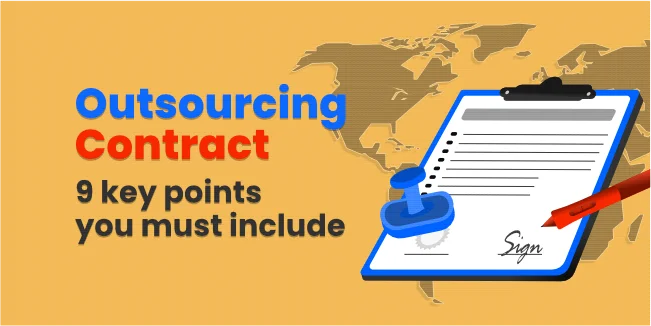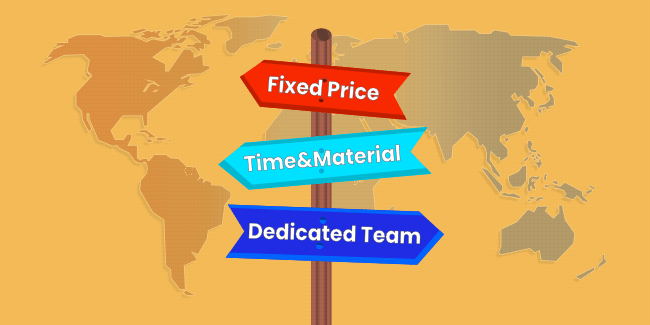outsourcing
contract
outsource
Outsourcing Contract - 9 key points you must include

Although IT outsourcing has enjoyed unflagging popularity for years, it is still a big challenge for some people, especially when they start their adventure with outsourcing for the first time.
As with any task, you also need to be prepared for it. Certainly, the key to success is finding a trusted software partner. However, to ensure the mobile application development or other software project is going smoothly, it is worth creating a contract that will include, among other things, each party's obligations. It protects the interests of all project participants and gives you peace of mind and a sense of security.
What is an Outsourcing Contract?
Outsourcing contracts are now a standard as they protect the principal and the contractor (outsourcing vendor). The issue of trust has nothing to do with it because some projects are long-term, and many things can happen. Therefore, both your interests and those of the outsourcing service provider must be protected.
An outsourcing agreement, or an outsourcing contract, is a legal document signed by both parties to an outsourcing project. It contains project requirements (including scope), prices, and agreed time frames. It also regulates confidentiality issues and issues related to intellectual property rights and customer intellectual property. It defines the terms and conditions for using these resources in a pre-existing intellectual property situation.
Outsourcing agreements must contain as much information about the project as possible to avoid possible misunderstandings and mutual accusations in the future. In addition, in the event of a breach of contract by either party, settlement and compensation conditions must be defined. A well-constructed contract also specifies which outsourcing services are considered services rendered, which is often the cause of disputes.
Types of Outsourcing Contracts

A well-designed outsourcing agreement is critical to the success of software development outsourcing. It is worth knowing that there are 3 types of outsourcing contracts, depending on your chosen price model. Below you will find critical information about the most popular types of outsourcing agreements.
-
Time & Material Outsourcing Contract
It is a highly flexible contract type that cooperates with an outsourcing company because it allows for implementing changes during the contract term. This type of contract specifies the amount of payment for the work performed concerning its duration and the value of the tools used.
In this model, you can verify the project's status on an ongoing basis and make any changes. The main distinguishing feature of this model is the economy because the customer always pays for the work performed.
-
Fixed Price Outsourcing Contract
This type of contract is often also called a fixed-cost outsourcing contract. The essence of this contract is that the customer and the supplier agree on a fixed price to implement a given project.
The price is determined based on a well-described scope of work to be performed. A fixed price means a strictly defined scope of work and project completion date.
An undoubted advantage of such a contract is the price fixed in advance, which will not change. On the other hand, the downside is that you can't change the project continuously because it affects the price, which can't change after all. Therefore, this type of contract is only suitable for small and short-term projects that do not require a flexible approach.
-
Dedicated Team Outsourcing Contract
This type of contract assumes the employment of a dedicated team responsible for implementing your projects. Such a team functions like your internal team and can be assigned to any project.
It is worth considering such a model of cooperation in the case of long-term projects because you have at your disposal high-class specialists who, thanks to their knowledge and experience, will help you implement a successful project that impacts the development of your business.
9 Key Points to Include in Your Outsourcing Contract
The more elements the contract contains, the better the interests of both parties to the project are protected. Below we will discuss the key provisions that should be included in any contract for outsourcing services.
The detailed scope of the project is the most crucial part of any outsourcing contract. The more accurately the project is described, the better. And this applies to both the client's and the contractor's interests because all parties to the project are clear about their duties. It allows you to ignite the work most effectively and, just as importantly, avoid future misunderstandings.
Each contract should contain detailed information regarding the price. If you have opted for a fixed-price cooperation model, the contract must contain detailed information about the services the fee is for and the price.
If you have decided on a different cooperation outsourcing model, remember that the contract should include detailed regulations on calculating the amount. Of course, there must be information on payment dates and situations when fees are not regulated.
-
Duration of the Agreement

No contract lasts forever, so it is essential to include the date when the agreement enters into force and when it terminates. While there is usually no problem with the start date, unfortunately, it sometimes happens that the end date of the contract is problematic. It is especially the case in long-term projects where it is difficult to determine a specific project completion date. Then, it should be described in detail in what situation the contract ceases to apply. For some, the end of cooperation is, for example, the moment the application is published in the Google Store or App Store; for others, it is only half the duration of the contract. Therefore, be sure to specify this issue to avoid unpleasant surprises.
It is essential to determine the properties of the finished product already at the stage of creating the contract. Especially in software development projects, this is of fundamental importance.
If something goes wrong, you may be left without access to the source code of your own software, so you will not be able to modify/correct/adjust it to the changing market realities. That is why it is so important to define the product's ownership immediately and write it down in the contract.
Each outsourcing company must ensure an appropriate level of quality for the projects it creates. For example, an application is incomplete when its imperfections prevent users from using it without problems. The third-party provider should fix defects immediately and ensure the application functions properly. The details of the guarantee and enforcement arrangements must be included in each contract.
-
Intellectual Property Rights & Data Protection

Intellectual property rights are something that gives employers sleepless nights. Completely unnecessary. When starting cooperation with any external company, signing an NDA, i.e., a non-disclosure agreement and including a non-competition clause in the contract, is necessary. When working with an external company, you should be sure that all external employees working on your project will not disclose confidential information, mainly information regarding intellectual property.
Our experience shows that the provision in the contract of huge financial penalties for disclosing any secret of the company makes it very easy for external suppliers to ensure that no confidential information leaks outside the company.

There is always the possibility that something will go wrong. Therefore, the contract should contain a provision for the amicable settlement of the dispute. It will allow both parties to negotiate and agree in a problematic situation. Of course, this does not mean that you will not take legal action if an agreement cannot be reached, but it is essential to remember that this is a last resort.
The contract should include a provision regarding the possible compensation amount and information on when the supplier must pay compensation. It protects your company against any losses during or after the project.
Many outsourcing companies use subcontractors. However, you must be aware that it is up to you whether you agree to subcontract or not, and the external partner must adapt to your decision. The contract should include the appropriate provision regardless of how you approach this issue.
Conclusion
A carefully prepared outsourcing agreement protects the interests of both you and the external partner. The issues we have touched on in this article are fundamental issues that should be included in every contract. When creating a contract, it is worth considering the project's assumptions and possible threats - and adding additional provisions that will make you feel safe and comfortable. If you are creating such a contract for the first time, do not hesitate to consult a lawyer specializing in such matters. It is better to spend more time and money preparing the proper document than to be afraid that something will go wrong.